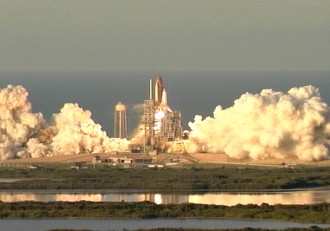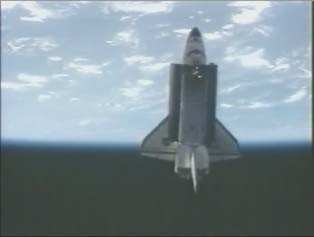Will Study How Bacteria Change In Microgravity
 An experiment by a group of college
students that will study how microbes grow in microgravity will
head to orbit aboard space shuttle Atlantis when it launches from
the Kennedy Space Center.
An experiment by a group of college
students that will study how microbes grow in microgravity will
head to orbit aboard space shuttle Atlantis when it launches from
the Kennedy Space Center.
Undergraduate and graduate students at Texas Southern University
in Houston developed the experiment that will fly as part of the
STS-129 mission, which launched at 1428 EST, November
16th.
"I'm thrilled that giving students the chance to design and
research an experiment to fly in space is one of the tools we have
at NASA to engage them in science, technology, engineering and
mathematics," NASA Deputy Administrator Lori B. Garver said." These
young people are our future, and providing an opportunity to
inspire them is a major part of our mission at NASA."
NASA's Office of Education selected Texas Southern University as
a 2008 University Research Center. Texas Southern established a
Center for Bio-nanotechnology and Environmental Research. Students
at the center developed the Microbial-1 experiment to evaluate the
morphological and molecular changes in E. coli and B. subtilis
bacteria.

"The University Research Center Project is designed to enhance
the research infrastructure and capacity at minority institutions,"
said Katrina Emery, NASA's University Research Center project
manager at the agency's Dryden Flight Research Center in Edwards,
California. "By engaging in participatory learning opportunities
like this experiment, students can see themselves as researchers,
now and in the future."
This space shuttle flight experiment is a proof-of-concept model
for the URC project to give students hands-on experience. The
experiment provides the university students the opportunity to
design, monitor and execute the study in laboratories, as well as
near real-time on the space shuttle. Each component of the
experiment is designed for easy reproduction in the classroom,
providing a valuable experience to students.
"This is an amazing opportunity for our students, and it
reflects the growing quality of our research programs at Texas
Southern," said John M. Rudley, president of Texas Southern
University. "We are excited our students have the opportunity to
participate in such relevant research. We are also pleased that
with our partnerships with area school districts, we are able to
take these projects beyond the university to the school classrooms
to encourage more students to study science, math, and
technology."

The unique experimental data will be used to develop
grade-appropriate microbiology modules for students in kindergarten
through twelfth grade. Data downloaded from NASA's Payload
Operations and Control Center will be available on the research
center's Web site. In addition, educators will receive a teacher's
guidebook featuring background information, lesson plans and
student activities for conducting this project in their classrooms.
BioServe Space Technologies at the University of Colorado is
providing management support and hardware for the experiment.
Texas Southern University is one of 13 universities to receive
grant funding from NASA's University Research Center project. The
project is designed to enhance the research capabilities of
minority-serving institutions and increase the production of
underrepresented and underserved students majoring in science,
technology, engineering and mathematics disciplines.
 ANN's Daily Aero-Linx (05.06.25)
ANN's Daily Aero-Linx (05.06.25) ANN's Daily Aero-Term (05.06.25): Ultrahigh Frequency (UHF)
ANN's Daily Aero-Term (05.06.25): Ultrahigh Frequency (UHF) ANN FAQ: Q&A 101
ANN FAQ: Q&A 101 Classic Aero-TV: Virtual Reality Painting--PPG Leverages Technology for Training
Classic Aero-TV: Virtual Reality Painting--PPG Leverages Technology for Training Airborne 05.02.25: Joby Crewed Milestone, Diamond Club, Canadian Pilot Insurance
Airborne 05.02.25: Joby Crewed Milestone, Diamond Club, Canadian Pilot Insurance





